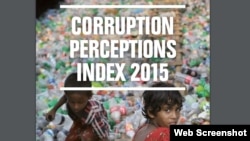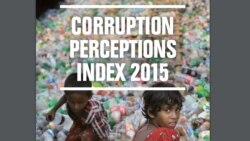The watchdog group, Transparency International-Zimbabwe is cautiously lauding the government’s anti-corruption drive, which now enables members of the public to unanimously report cases of corruption, particularly by law enforcement agents.
Transparency international, which monitors levels of corruption around the world and releases annual ratings of the scores, ranked Zimbabwe 150 out of 168 countries in the world, in 2015.
Loughty Dube who heads TI-Zimbabwe said the move is a step in the right direction.
“It’s a commendable exercise in the sense that we are just getting a commitment from government,” said Dube.
To enable citizens to participate in bringing down corruption, Zimbabwe last week issued out so called green cards with phone numbers for various sections, including the Office of the Attorney General, the Judicial Service Commission, the Prosecuting Authority, the Prison Services and the Law Society of Zimbabwe, where the public can report incidents of corruption.
But Dube said the problem is not that citizens don’t know what to do or where to go to report corruption, but that the offices responsible are ineffective.
“They do know,” said Dube. “They’ve seen that when they’ve tried to report in the past nothing has happened and people have just come to the conclusion that whatever is obtaining has the support of the government, the corruption that we see is supported by the government.”
Even with the new efforts by government to encourage the public to be more forthcoming with incidents of corruption, Dube said he doubts many will respond.
“From experience, I do not see them now all of a sudden thinking that the government is committed to dealing with corruption, and they’ll start coming up and exposing it,” said Dube. “I think they’ll be a bit of skepticism drawn from previous experience that ultimately whatever they say or do, nothing will happen.”
Dube argues that it will take a lot for the public to take the government’s anti-corruption stance even after the establishment of the Anti-Corruption Commision, which itself has been spotted for gross corruption. The Commission’s chief executive Ngonidzashe Gumbo was last year found guilty of defrauding the commission of more than US$400,000.
Dube said that’s the extent government has shown its effectiveness.
“They (government) have failed to deal with corruption, and the only instance when they tried to do that, we saw commissioners being arrested,” Dube said.
Transparency International aims to stop corruption and promote transparency, accountability and integrity at all levels across all sectors of society, according to its web site.






